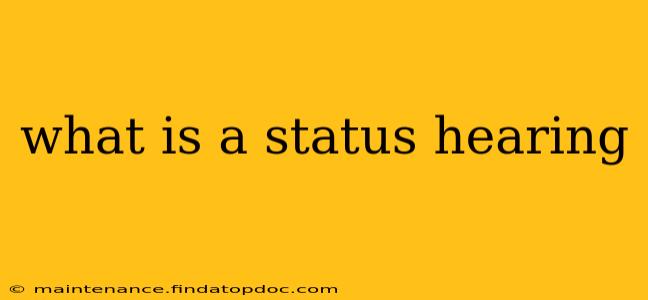A status hearing, often called a case management conference or progress report hearing, is a relatively short court proceeding where the judge checks the progress of a case. It's not a full-blown trial or argument; instead, it's a quick update to ensure the case is moving forward efficiently and to address any roadblocks. Think of it as a progress check-in for the judge. This guide will explore what happens during a status hearing, who attends, and why they're essential in the legal process.
What Happens During a Status Hearing?
The primary purpose of a status hearing is to gauge the current state of the case and identify any potential issues. The judge will typically ask questions like:
- What progress has been made since the last hearing (or filing)? This includes discovery completion, motion filings, settlement negotiations, and expert witness identification.
- Are there any outstanding issues or disputes that need immediate attention? This could range from disagreements over evidence admissibility to scheduling conflicts.
- What is the anticipated timeline for the remaining steps in the case? The judge will want to ensure a realistic schedule is in place to bring the case to a timely resolution.
- Are the parties engaging in good faith efforts to resolve the case? This is particularly important in cases where settlement is a possibility.
The hearing itself is usually brief. Attorneys for both sides will provide a concise update on the case's progress. It's not an opportunity for lengthy arguments or extensive evidence presentation. The focus is on efficiency and problem-solving.
Who Attends a Status Hearing?
Typically, the following individuals attend a status hearing:
- The Judge: Presides over the hearing and guides the discussion.
- Attorneys for each party: Provide updates on the case's progress and address any questions from the judge.
- Parties involved in the case (sometimes): While not always required, the judge may request the presence of the parties involved, especially if there are significant issues to discuss or if settlement negotiations are involved. This is more common in simpler cases.
Why Are Status Hearings Important?
Status hearings serve several crucial functions in the legal system:
- Case Management: They ensure the case progresses efficiently and doesn't get bogged down in unnecessary delays.
- Early Dispute Resolution: By identifying potential problems early, status hearings can help prevent larger issues from developing later on.
- Encouraging Settlement: Judges often use status hearings to encourage parties to explore settlement options and resolve their disputes outside of a full trial.
- Judicial Economy: By streamlining the process, status hearings save time and resources for both the court and the parties involved.
What if I Don't Attend a Status Hearing?
Failing to attend a status hearing can have serious consequences. The judge may impose sanctions, such as fines or even dismissal of the case. It's crucial to attend all scheduled hearings unless there is a compelling reason for absence, which should be communicated to the court in advance.
What is the Difference Between a Status Hearing and a Case Management Conference?
While the terms are often used interchangeably, a case management conference is generally a more comprehensive meeting, often held earlier in the litigation process to establish a detailed case plan and schedule. A status hearing is typically shorter and focuses on reviewing progress against that established plan.
How Long Does a Status Hearing Typically Last?
The duration varies greatly depending on the complexity of the case and the number of issues to address. However, most status hearings are relatively brief, lasting anywhere from a few minutes to an hour, rarely longer.
Can a Status Hearing Result in a Judgment?
Generally, no. A status hearing is not designed for rendering judgments. Its purpose is to manage the progress of the case, not to decide the outcome. However, a judge might issue rulings on procedural matters discussed during the hearing.
In conclusion, a status hearing is a vital component of the legal process, designed to ensure efficiency, promote resolution, and manage the overall progress of a case. Understanding its purpose and importance is essential for anyone involved in legal proceedings.
